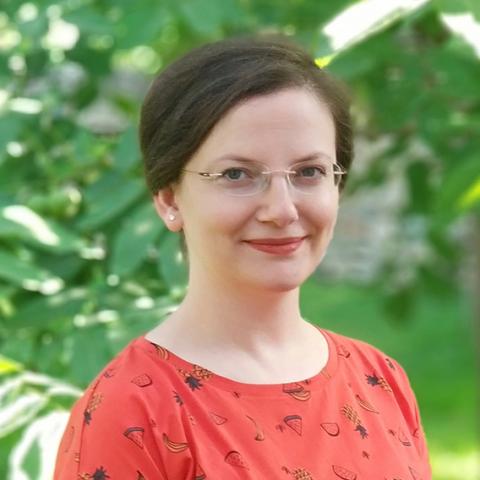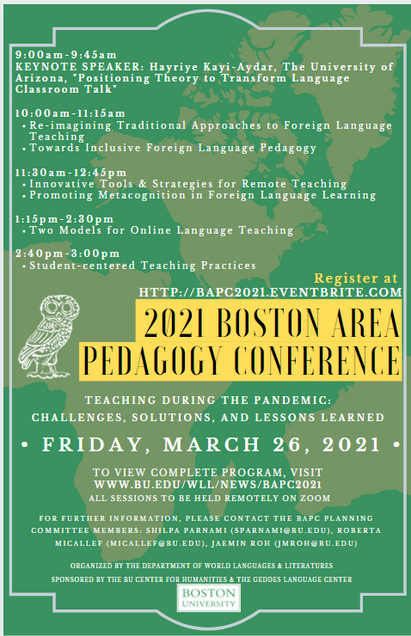2021 Boston Area Pedagogy Conference
A Virtual, Inter-Institutional Dialogue on the Teaching of Languages, Literatures, Cultures, and Cinema
Teaching During the Pandemic:
Challenges, Solutions & Lessons Learned
To view the complete complete program with session titles and presenters, please click here.
For further information, please contact the BAPC planning committee members: Shilpa Parnami (sparnami@bu.edu), Roberta Micallef (micallef@bu.edu), Jaemin Roh, jmroh@bu.edu, WLL faculty, and Director of the Geddes Language Center: Mark Lewis (mslewis@bu.edu).

Keynote speaker, Hayriye Kayi-Aydar, from the University of Arizona. Her talk is titled, “Positioning Theory to Transform Language Classroom Talk”.
Positioning Theory to Transform Language Classroom Talk
In order to understand the nature of identity work and participation in language classrooms, we must ask questions such as: How is power distributed? Who is given the right to speak? Who gets access to learning opportunities? Positioning Theory (Davies & Harré, 1990, 1999) is a powerful tool to address these and other similar questions and illustrate how the classroom instructor and students position themselves and others as they engage in moment-to-moment interactions. Positioning theory can illuminate important elements that are crucial for second language learning or teaching, such as speaker rights, identities, socialization, morality, and so on. A closer look at positioning moves in the classroom also pushes us, classroom teachers, to re-think “taken-for-granted” story lines in which students are recursively positioned in certain ways. Understanding positioning in classroom talk can ultimately make a difference in teachers and students’ own performances. In this talk, I briefly introduce Positioning Theory and then demonstrate how language teachers can use it as a pedagogical tool to understand the complexities associated with language classroom talk.
Author Bio
Hayriye Kayi-Aydar is Associate Professor of English Applied Linguistics at the University of Arizona where she teaches courses on language teaching methodologies, discourse analysis, and research methods in the MA TESL and PhD SLAT programs. Her current research interests include teacher learning, professional identities of teachers and intersectionality, teacher agency, and positioning theory. Her work has been published in various edited volumes and academic journals such as TESOL Quarterly, Teaching and Teacher Education, System, ELT Journal, TESOL Journal, Classroom Discourse,among others. She is the author of the monograph Positioning theory in applied linguistics: Research design and applications (Palgrave MacMillan, 2019) and co-editor of the book Theorizing and analyzing language teacher agency (Multilingual Matters, 2019).
